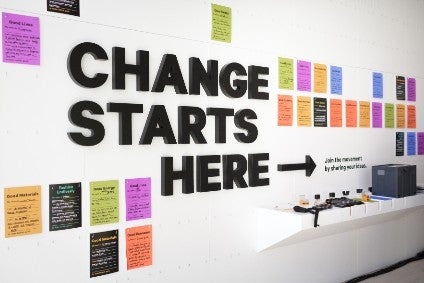
13 new innovators have been virtually selected to join the latest round of the Fashion for Good Accelerator Programme through an online webinar organised to overcome travel and health restrictions imposed during the Covid-19 pandemic.
Fashion for Good aims to help brands, retailers and manufacturers find more innovative and sustainable ways of producing fashion.
Its first virtual Selection Day yesterday (19 March) saw an international audience of corporate partners and 21 innovators from around the globe join the online meeting to pitch their ideas as well as take part in multiple workshops and panel discussions. Previous Selection Days have been hosted in the Fashion for Good headquarters in Amsterdam.
“Despite changing circumstances, our important work for innovation continues. For the first time, we hosted our Selection Day virtually. As such, we are excited to welcome 13 innovators into our Programme, representing the most disruptive solutions in the areas of raw materials and wet processing,” says Katrin Ley, managing director Fashion for Good.
The seventh batch of innovators is the first to participate in Fashion for Good’s restructured Accelerator Programme, which will run for nine months and offer tailor-made mentoring, personal guidance on impact assessments, funding support and market validation from programme and affiliate partners who include Adidas, C&A, Kering, PVH Corp, Target and Zalando.
The selected innovators are:

US Tariffs are shifting - will you react or anticipate?
Don’t let policy changes catch you off guard. Stay proactive with real-time data and expert analysis.
By GlobalDataBear Fiber (USA): Bear Fiber is developing a novel biotechnological cottonisation process and manufacturing platform for fibre production with hemp that uses less water and energy. The cotton-like hemp fibre and yarns can be easily spun with cotton to produce textiles and finished garments.
NTX: Cooltrans (Singapore): NTX: Cooltrans is a novel dye system that provides high-speed duplex print of patterns and solids with a very high resolution. The technology comes with great energy, water and chemical savings and is applicable to natural, man-made and synthetic fibres.
Dryfiber (USA): Dryfiber provides a fluorine-free durable water and oil repellent textile finish which is completely waterbourne and can be applied through traditional finishing processes.
Econic (UK): Econic provides an innovative catalyst technology that facilitates incorporation of waste CO2 as a raw material into polyols, replacing up to 50% of traditional oil-based feedstocks. Waste CO2 is cheaper than oil-based raw materials, plus offers enhanced product performance and environmental benefits.
Fairbrics (France): Fairbrics provides a novel process to create ethylene glycol (a component of polyester) from waste CO2. The resultant chemical is identical both chemically and practically to petroleum-based ethylene glycol.
Full Cycle Bioplastics (USA): Full Cycle’s patented technology converts waste streams such as inedible food waste, agricultural by-products and used paper/cardboard into Polyhydroxyalkanoates (PHA) bioplastics that degrade in the soil and the ocean.
GALY (USA): GALY engineers cotton in labs through the multiplication of cells directly into the cotton fibre, removing steps of traditional cotton farming. As a result they can grow cotton without the use of pesticides or fertilisers, using considerably less water.
HydroCotton (UK): HydroCotton grows sustainable cotton in a transparent way. HydroCotton is developing a technology for cotton agriculture that reduces water and fertiliser by 80%, while also being grown in an insecticide-free environment.
Imogo (Sweden): Imogo focuses on sustainable production processes, primarily in the textile industry. Its innovative new processes for dyeing textile materials that can dramatically reduce the wasteful use of water, chemistry and energy in the textile dyeing process.
NREL (USA): NREL works on the development of a polyurethane for carbon capture, reuse and sequestration. It uses microalgae as a feedstock to explore the production of various products for polyurethanes, polyurethanes, plastic composites to name a few.
Oritain (UK/New Zealand): Oritain wants to be the most trusted company in the world at scientifically proving origin. It provides traceability through an innovative combination of forensic science and statistics. It believes that in order to know where something truly comes from, you have to test the product itself.
Recycrom (Italy): Recycrom is a dyestuffs range made using recycled, used clothing, fibrous material and textiles scraps made from cellulosic fibres. The dyestuff can colour any cellulosic and natural fibre as well polyamide.
Tinctorium (USA): Tinctorium produce natural, pre-reduced Indigo dyes that are a drop-in replacement for synthetic Indigo, free of impurities with the same performance as synthetic Indigo. Click here to read just-style’s coverage of Tinctorium.
The current circumstances surrounding the Covid-19 pandemic have seen a number of industry players turning to technology in a bid to weather the storm. Organisers of the ‘Make it British Live!’ sourcing show are planning a virtual event following the postponement of this week’s event, while UK fashion and homeware retailer Next Plc is looking at different scenarios to make up for the lack of face-to-face contact, including video conferencing.




